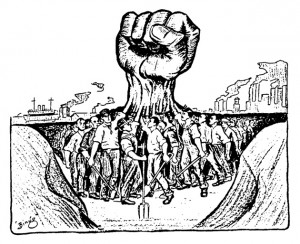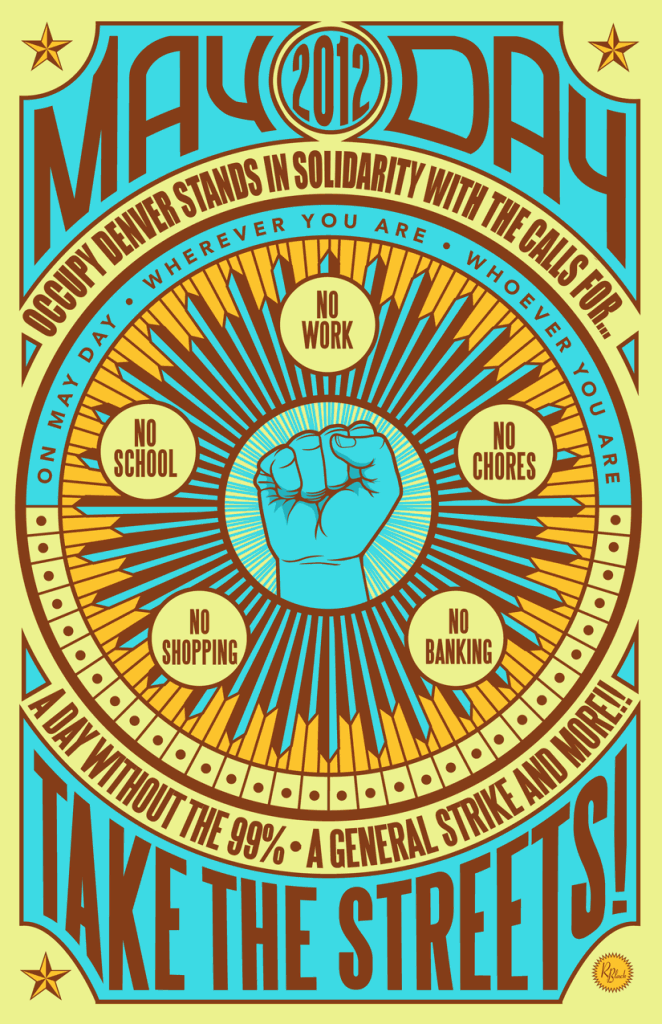 From Slingshot!Issue #109
From Slingshot!Issue #109
By Jesse D. Palmer
The call for a global general strike beginning on May 1 is exciting and with luck, millions of people will rise up and shut down the economy — but we need to make sure any general strike has a strong foundation, moves our struggle in a positive direction and addresses regular people who aren’t already active within the occupy scene. Calling a general strike — in which everyone in every industry and job is asked to risk their livelihood by walking out — is a dramatic act. If successful, it would mean stores and factories would close, transport would cease to function, and day-to-day commerce would grind to a halt.
There is a risk that those calling for the strike are being romantic and impractical — getting ahead of themselves. Most of the hundreds of occupations around the country are just in the beginning stages of the long, difficult process of building social connections to large numbers of regular people in the community — a necessary pre-requisite for effectively pulling off a general strike. While building an effective general strike is a major long-shot, it is not entirely impossible given the powerful social contradictions disclosed by the occupy movement, which the mainstream political and economic system is incapable of addressing.
Some of the calls for action circulating as Slingshot goes to press that try to explain why there should be a general strike need additional thought and work. For example, the call to action issued by Occupy LA reads, in part, “The goal is to shut down commerce worldwide and show the 1% we will not be taken for granted, we will not be silenced, WE WILL NOT MOVE until our grievances are redressed.”
Now is not the time to reduce the beauty of the occupy phenomenon to protesting-as-usual in which we organize events for the sake of organizing them — without really believing our own rhetoric or aiming to succeed — or in which we beg our rulers to redress grievances for us. This concedes that those in power are legitimate and have a right to retain their power. Why should we beg them for crumbs rather than uniting to topple them?
We have to ask whether we really want any of the things those in power can give us? The reason so many of us occupied across the country is that the political and economic systems are broken. Our votes, our job searches, our compliance with bureaucratic rules, our passive acceptance of corrupt power structures — none of it got us anywhere. Within the occupation, we dismissed our faith in the failed system and instead built our own solidarity, community and power to begin to redefine what is important in the world and destroy the structures of power that stop us from living the lives we really want.
In a redefined world, the capitalists, the bankers, their politicians and the whole modern power structure will be as irrelevant and ridiculous as the kings, serfs and slavery of 200 years ago seem to us now.
Occupy is, fundamentally, about class struggle. The wealth gap between the majority of people who work for a living and the tiny fraction who skim off most of the money by virtue of owning stuff, not by working, has reached a breaking point. Anything the rulers own was created by us — those who work. Yet decades of propaganda have sold many people on the idea that we need the rich as “job creators” and that if they get richer, their wealth will eventually “trickle down” to those below.
The first phase of the occupy movement has been about gathering strength, recognizing our numbers, grasping community, and liberating a wide-ranging critical discussion of the existing power structure. The crucial role of opening up dialog cannot be overstated. It is hard to remember how unfashionable and difficult it was to talk about class inequality and economic injustice just a few months ago. Slogans like “we are the 99%” articulated something everyone knew, yet few wanted to openly discuss. We have to start by killing the businessman in our heads.
But as powerful as standing up against gross economic inequality felt last fall, the occupy movement can’t succeed by just being against things. We are for a new kind of world and while part of it is about money and a fair distribution of wealth, our real power comes from something deeper. Being for something new brings us creative, courageous, passionate juices that arise from love. That is one reason why our occupations felt so meaningful — we were building a community and creating libraries, kids villages, medic tents, general assemblies, rather than just being against something.
The key to a new world is not just re-distributing money in a more reasonable fashion. Rather, the key is exposing the big lie behind the corporate rat-race that the 1% are pushing — that our lives are mostly about money and things and that a pay increase or a fatter bank account will give us satisfaction. Capitalism requires constant economic expansion, which means the system has to constantly psychologically manipulate us to want more, buy more and work more. The list of material goods and services that defined a “good life” in 1950 would be considered poverty in 2012. And the things we want now won’t seem like enough in another ten years, unless somehow we step off the hamster wheel.
In developed economies like the US, we’re way past the point where more stuff improves our lives. The typical suburban house keeps getting bigger, cars and electronics keep getting more sophisticated and super stores are stuffed with products. Many people are always seeking the next new thing or experience but when they get there, it always feels somehow empty. The system expands by transforming things we once did for ourselves, our families or our communities into services provided by industry — entertainment, cooking, grooming, healthcare, childcare. The economic machine expands voraciously, addressing its own needs for growth rather than human needs for freedom, connection and engagement.
Psychologically, many of us suffer fallout from these economic imperatives and assume that bigger is always better, leading us to try to improve the size and scale of our protests and actions, rather than concentrating on the quality of our actions. So if an occupation or protest is good, the next action has to always be bigger, more disruptive, louder.
The most important aspect of the early days of the occupy movement was not size, per se, although it was important that the moment spoke to people and that a lot of people plugged in. Rather, the novel thing was the way we felt at the occupation — the amazing sense of engagement, agency, community and dialog.
Those days and those experiences were so powerful to so many of us that now, our attempts to re-create those feelings may paradoxically make it more difficult for us to move forward. Feeling so good is like crack — we want that feeling back. But you cannot organize the surge of excitement that was present at the birth of the occupations — it happened because conditions were right and we were lucky enough to be there to experience it. That doesn’t mean we can’t keep things moving, but there is a danger in trying to simplistically re-create the particular tactics or symbols of particular moments rather than staying aware of the mood now and letting that be our guide as tactics change and evolve.
Calling a global general strike can be a reasonable tactic to respond to social conditions, but for it to be relevant it has to be part of an integrated struggle — it has to evolve organically from our lives and our communities. It has to be big but also deep, touching grassroots and hearts. We have to go beyond making big actions for their own sake if by doing so the exercise feels alienating or meaningless. To avoid that, we have to figure out how our actions will keep us present, build community, encourage critical thinking, create dialog, while discrediting and de-legitimizing the system. How can we point out the absurdity of a system where a handful of people control everything because of a few numbers on a computer screen? Billionaires and their fortunes are the modern equivalent of the divine right of kings.
Engaging and changing minds is way more crucial than providing “colorful visuals” for media consumers. Our actions have to avoid becoming just another part of the modern media spectacle — we are not faceless numbers at a protest. How can we avoid getting distracted by traditional traps — endless ritualized struggles with the police or boring engagements with election year politics — and instead focus on creating an alternative narrative outside of the currently available categories? To keep the scene moving in a positive direction, we have to focus on as big a picture as we can conceive and bring up ideas not currently on the table.
While autonomous action has been a key strength of the occupy movement, and the original Wall Street occupation came out of an autonomous call from Adbusters magazine rather than consultation with the community, we may now be suffering from too much of a good thing as many occupations, organizations and individuals all simultaneously call ambitious, sometimes national actions like the multiple, simultaneous calls for a general strike. There is a fine line between an autonomous action and an adventurist action. It is probably impossible to get a good balance between autonomous action and actions designed by committee that, after going through too many general assemblies and quasi-bureaucratic hoops, become mushy, watered down exercises that appeal only to the lowest common denominator. Still, we can think about the tension and try.
As Slingshot goes to press, there are three months left to build a national general strike. That’s not long for a traditional gradual organizing campaign, but an eternity for a wildfire or an idea whose time has come. Resistance can easily take off if it tastes delicious in everyone’s mouth. This has to go far beyond the relatively small pockets that occupied last fall, and that only will happen if we keep our mind on the quality of the process and the feeling of engagement and participation. We can make the general strike if we do it for ourselves and the world we are creating and if we do it with love in our hearts.



